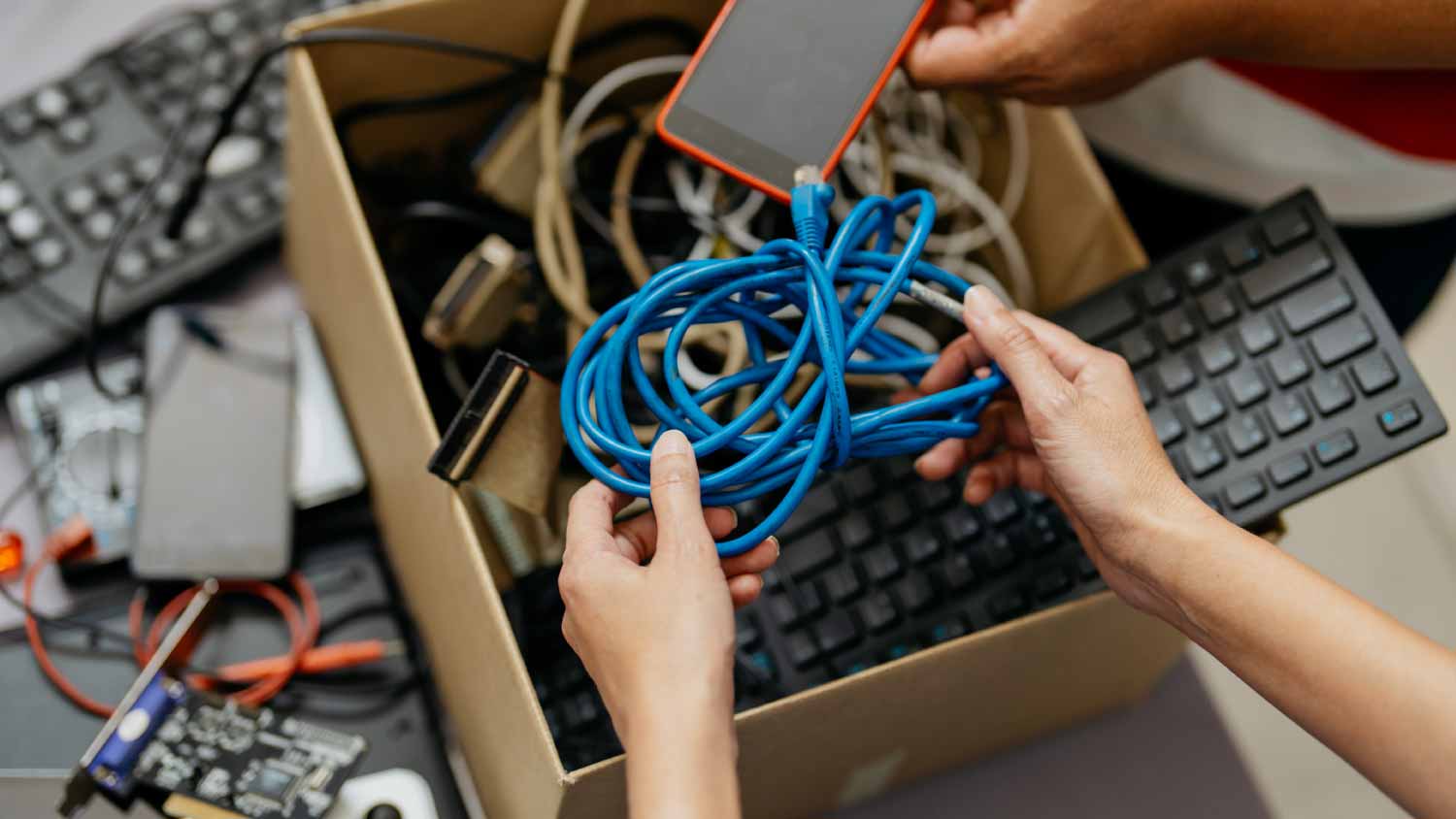What Is Considered Electronic Waste?
Think twice before you toss your unwanted electronics


Electronic waste or e-waste applies to end-of-life electronics that will be tossed rather than reused.
Light fixtures, fans, laptops, computers, smartphones, and refrigerators are all considered e-waste.
Since these devices are often made with toxic chemicals, e-waste can take a toll on the environment if not disposed of properly.
What Is Electronic Waste?
Also known as e-waste, electronic waste refers to any electronic products that will be thrown away rather than reused in some capacity. Believe it or not, the U.S. produces 9.4 million tons of e-waste each year.
Electronic waste is often made of toxic materials such as mercury, lead, beryllium, and cadmium, which can all lead to serious health complications if released into the environment. Therefore, it’s important to be mindful of what we do with our electronics and do our best to find a way to reuse them or any of their components.
Popular E-waste Categories

E-waste refers to any type of electronics that will be discarded instead of reused. The most common categories of electronic waste include:
Heating and Cooling: This category includes air conditioners, electric heaters, fans, and any other devices you use to heat or cool your home.
Office Equipment: Laptops, desktop computers, keyboards, monitors, scanners, fax machines, and docking stations are all examples of office equipment that can become electronic waste.
Large Appliances: Large appliances, such as refrigerators, ovens, dishwashers, washers, and dryers, are widely used in many homes but can quickly turn into e-waste if they’re thrown out.
Small Appliances: Mixers, microwaves, toaster ovens, coffee machines, hot plates, and crockpots that are tossed instead of reused will be considered electronic waste.
Telecommunications: Perhaps the most popular types of e-waste fall into the telecommunications category and may include smartphones, pagers, routers, chargers, and network hubs.
Lighting: Lamps, light fixtures, and light bulbs, including LEDs, are examples of electronic waste when they’re not properly recycled.
Personal Appliances: Personal appliances that you might use for personal care purposes, such as electronic toothbrushes, hairdryers, water picks, and curling irons, may harm the environment if they become e-waste.
Why Is It Important to Recycle E-waste?
The issue with electronic waste is that most electronics contain hazardous materials. When left in landfills for a while, they can enter the soil and water, leading to pollution, which can pose significant dangers for humans, animals, and the environment.
If you treat electronics like garbage and toss them when you no longer want or need them, you’ll add to the problem rather than mitigate it. If you have e-waste lying around that you’re not sure how to dispose of, consider calling a local junk removal company to see if they offer any relevant services.
How to Reduce E-Waste
Fortunately, there are steps you can take to keep electronic waste to a minimum, including:
Extend the Lifespans of Your Electronics
Do your best to take good care of your devices. Depending on the device, this may mean replacing worn batteries, using screen protectors, and keeping them out of moisture or environments with extreme temperatures. Not only will extending the life of your electronics save you money, but it will reduce your e-waste contribution.
Sell Unwanted Devices
Someone else may be in the market for devices you no longer want or need. If you have a device that works, it’s a good idea to sell it. Facebook Marketplace, Amazon, Best Buy, Apple, and Samsung are all great resources that can help you earn cash for your electronics and save the environment while you’re at it. However, before you sell a device, don't forget to remove your personal information.
Donate Unwanted Electronics
There are many local and national organizations that will gladly accept your old electronics as donations. Donating keeps harmful chemicals out of landfills and supports a charity or your community. You can find local nonprofits or donate to a national program like Cell Phones for Soldiers or the World Computer Exchange.
Recycle Unwanted Devices
If you’re confident your devices are at the end of their useful life, be mindful about how you recycle them. Find local electronic centers that pledge to safely dispose of your electronics in ways that cause minimal harm to the environment. Contact your local municipality or visit their website for more information.
Buy Used Electronics
The next time you want to buy a new device, look for used options. A refurbished computer, for example, can still meet your needs. While new electronics may be more appealing, investing in their used counterparts instead is far better for the environment.
Frequently Asked Questions
Yes, many states have laws that require e-waste recycling. These include North Carolina, Virginia, Maryland, Pennsylvania, and New Jersey, just to name a few. Search online for your state and municipality’s regulations on e-waste for more specific information.
The Global E-waste Statistics Partnership (GESP) aims to collect worldwide e-waste statistics in an internationally standardized way. It also works to bring awareness to electronic waste and the issues it causes.
You may not be able to recycle certain types of electronics. Some examples of electronics that might be rejected from the recycling process are LCD televisions, LCD computer monitors, and older televisions with mercury.





- Your Guide to Disposing of Electronics Responsibly
- How to Dispose of Household Hazardous Waste Safely
- How to Remove Yard Waste: 3 Methods to Keep Your Yard Tidy
- 5 Waste Disposal Methods
- What Is Considered Hazardous Waste?
- How to Get Rid of the Trash and Junk Accumulating in Your Home
- 5 Ways to Make Your Next Move More Sustainable
- How to Hire Yard Waste Removal Services
- Who Will Pick Up Yard Waste?
- How to Reduce Household Waste for a Cleaner Home and Mind










